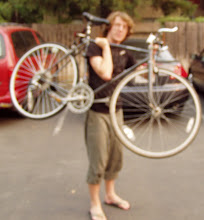It seems an age ago that I was sitting with Marisa on our high school bleachers during lunch period, discussing love. It was a conversation that had been waiting to happen for a few months. She kept telling me, "I love you, Max." I never knew how to respond. I didn't feel like I understood what love was well enough to profess my love for someone.
So there we were, five years ago, Marisa finally asking me why I wouldn't say I loved her. I explained that I wasn't sure I loved anyone and that I didn't want to say so until I was sure it was true. She pressed on, "What about your family? Don't you love them?" She asked with the incredulity of a Mormon and ultrafriend. I thought for a minute, mulling things over, and decided, "I guess I love my sister. If I love anyone in the world it is my sister." "Don't you love your parents?"
So often love appears like water. Clear and invisible when we're standing still in the midst of it. I told her that I wasn't sure. I told her that I supposed I must, but if love was there I didn't know what I was supposed to be looking for. This was how I assuaged one of my best friends about refusing to say I loved her back.
I think at the time I thought she might use the word love too liberally. I was also wary because just a few months before my friend Caius had broken her heart by telling her he didn't love her anymore, concluding their brief, intense relationship. I didn't think love should be the sort of thing that could be recanted, so I gave the word extra caution, sometimes even hostility.
It wasn't until midway through college that I began to respond "I love you too" on the phone to my parents. By then there'd been enough motion and distance between us for me to witness the invisible bonds of love I had for my parents. It wasn't until a few months ago, between Marisa's return from her mission in Czech and my trip to the Lost Coast with Caius, that I finally admitted I loved my close friends. At the beginning of the summer I broached the subject of love with Jill and over the course of the conversation decided I loved her and told her so. That adds another first to the long list of firsts that Jill has on me.
Recently, I've been paying attention to older-fashioned uses of the word love. People used to use the word so much more freely. They talked about love of friends, cousins and their favorite possessions. Love is now used in romantic comedies as something earth shattering and singular. It may be irrevocable, but love is not singular. I think I've been shielded from the nature of love by hyperbole. I've been divorced enough from the source of the word that I've had trouble recognizing it in my own life. Love happens every day.
To some extent I guess I love everybody. That's not to take anything away from the people I first declared love for. They were first for good reason. I love you guys. I just think we should approach love in that old fashioned way. Not the way hippies treat love as if it's some supernatural, omnipresent, omnipotent force and not the way romantic comedies elevate romantic love to the point of alienating all other forms and degrees of it. I want to reclaim the word from poets, panderers and theorists back to the simple meaning it began with. I want it to refer to the affection we feel for the people around us.
Subscribe to:
Post Comments (Atom)

3 comments:
I love you max.
I love this article. It reminds me of a meditation by Pete Seeger in which he declared the word "love" dead, killed by Madison Avenue. And also the wonnnderful song "I Love Everybody", by Lyle Lovett.
This is one of my favorite articles of yours. However, I never had any such "love" dilemma with you. I always knew you loved me!
Post a Comment